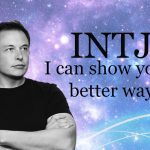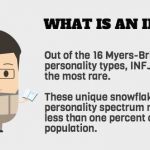The INTP personality type is very rare, making up only 3% of the population. This is however a good thing for them, because they like to draw and think outside the lines.
Their intellect and keen sense of understanding makes them ideal inventors. The level of logic the INTPs have at their disposal is unparalleled. Though often they appear to daydream, the fact is that they are wondering.
INTPs monitor and search the realm of ideas more than any other personality. For an INTP personality, nothing is impossible. it’s only a matter of time. When focused on a task, nothing can break their concentration and desire to explore.
I had the honor of meeting one INTP in my life. He is a bio-genetics researcher, and one of the most intelligent people I have ever met.
The INTP personality knowledge quest
“Everything can be explained.” This was the sentence my INTP acquaintance repeated numerous times. For INTPs, no stone will be left unturned when their mind gets excited and starts analyzing.
Often you will notice that an INTP personality seems confused, maybe even lost. The reality is quite different. Their cognitive process of thinking is so complex, that it can be compared to the Spock character from Star Trek.
Guided by logic, INTPs are not led by emotions. But that doesn’t mean that they don’t have them. They simply seek a logical solution that can help and be meaningful. Sometimes referred to as “cold”, INTPs say the truth that many don’t want to hear.
An INTP’s mind is their guide and biggest support
Far from being indifferent, the INTP personality thrives on originality. This doesn’t just apply in the career spectrum. If you have an INTP as a friend or a partner, you will never have to question: “Can it be done?” You will receive expert advice and guidance whenever you need it.
If you ever watched “The Big Bang Theory” TV series, take a closer look at Sheldon for an example of an INTP. Sure, he may seem rude, harsh, and sometimes even mean. But when his friends have a problem, he is the first person they seek. His intelligence, honesty, and hardcore reasoning are mesmerizing.
INTPs see multiple patterns and solutions in their mind. They seek ways not just to invent, but to improve at the same time. You can say that they are the “mind multitaskers”.
As William Arthur Ward wonderfully said:
“If you can imagine it, you can create it. If you can dream it, you can become it.”
Famous INTPs out there:
Abraham Lincoln
Ellen Page
Charles Darwin
Tina Fey
Albert Einstein
Kristen Stewart
Rene Descartes
Isaac Newton
Blaise Pascal
Stanley Crouch
Leslie Winkle (for all The Big Bang theory fans ☺ )
Do not underestimate an INTP
As a fellow introvert I know how hard it can be to express yourself. For INTPs, expression comes through the realms of brilliance and ideas.
Albert Einstein was considered “dumb” in school. People thought of him as “weird”, and eccentric. He even failed at his math test several times. What they didn’t realize was that Albert was smarter than all of them. He was simply directing his wisdom to more important tasks.
He was never interested in the “ordinary”. True to his INTP personality, he used his logic and creativity to change the world. If it weren’t for him, who knows how modern science would look today.
“Learn from yesterday, live for today, hope for tomorrow. The important thing is not to stop questioning.” – Albert Einstein
The true beauty of an INTP comes from their vigorous intellect. They are the beautiful dolphins of the personality spectrum. If you wonder, why the dolphin comparison? It’s because dolphins are scientifically proven to be one of the most intelligent creatures on Earth.
Over to you
Do you know an INTP in person? What are your thoughts on this incredibly rare, and wise type of personality? ☺
Xo,
Marko













As a (textbook) INTP, I have to take issue with “Everything can be explained.” In truth, it is closer to “Everything *must* be explained—even when it cannot be.” Everything hinges on a complete understanding, and I sometimes have to force myself to let go and not to try to understand something before just experiencing it. (It’s kind of all-or-nothing, actually.)
But don’t mistake this clarification for judgment or criticism. This is just my working theory, which I will defend it to the death even though I know I will probably think and feel differently about it tomorrow.
Thanks for sharing this great insight Graeme! No worries, of course, I really appreciate what you said. 🙂
Yes, this.
Sometimes I get so fixated on the why’s and how’s behind a thing (because I need to understand it and solve the issue) that I end up diving straight into the realm of inappropriate and offensive.
It really is hard to let things go sometimes, when your mind needs closure on something.
I’m an INTP myself and I LOVE your article,especially when you mentioned Spock and TBBT.I LOVE that show! ♡
Just one mistake: Sheldon Cooper is actually a INTJ.Not an INTP.Sheldon cares deeply about deadlines,rules and time.He has OCD.
Thank you so much Lumos for your kind words! Understood regarding Sheldon, I thought that the qualities he shows were expressing wonderful INTPs traits, so thanks for this insight. 🙂
Yes, and I believe Spock is generally considered INTJ as well. (But I doubt that Vulcans have the same personality types that humans do anyway.)
By the way, to anybody who is having trouble understanding an INTP’s apparent lack of emotion in a romantic relationship, I recommend the scene from Star Trek: Into Darkness, where Spock is explaining his apparent lack of caring to Uhura.”Nyota, you mistake my choice not to feel as a reflection of my not caring. Well, I assure you, the truth is precisely the opposite.”
Great article! I’m an INTP too and find this description quite accurate. I think that the people of this personality type are difficult to understand and accepted by others because of the way their mind works. So INTPs are often misunderstood and even socially rejected despite the fact that they are much more intelligent and deep than most people.
Thank you so much Anna! 🙂 Glad to hear the article resonated with you.
I’m an INFJ who married my high school sweetheart an INTP. While it has been emotionally challenging, I’ve always greatly respected his intelligence and logic. We have known for a long time that we make a fairly rare unique couple in the world of personality types.
That’s wonderful! I’m so glad to hear that you have this beautiful level of understanding, and acceptance with your partner Mborror. 🙂
Sheldon Cooper is actually a INTP… Analyze much closer, why is sheldon cooper INTP instead of INTJ or ISTJ? isn’t he clearly a J by the structure he imposes on his own life and others’?
image
That’s simple. Sheldon is not a Te-user, thus he cannot be IXTJ.
Subjective logic, not factual external logic. Ti-dom. Can you prove it, Sheldon? Nope. Just thought it up. Seems logical. He analyzes, not implements. Ti.
Theorizes, conceptualizes, is somewhat distract-able, and tends to leap in before he’s done theorizing or formulating, so he often screws up because of impulsive behavior in spite of logical soundness. Ti-Ne.
Then there’s his Si. I can’t eat this hamburger, it doesn’t have the same amount of pickles as last time, and I insist on having that number of pickles. Sheldon likes same-ness. He notices if things are different. He can be insanely anal about change. He likes the consistency of a routine in menial things (lifestyle, gaming, eating, etc).
Chastising, judging other people, craving approval and affirmation in his desire to be acknowledged as a genius — all Fe. Sheldon lets people know EXACTLY how he feels about stuff, all the time. Sure, some of it is based in Ti-logic, but it shows externally in tantrums and his craving for affirmation. Specifically, that’s inferior Fe.
http://funkymbtifiction.tumblr.com/post/98169076095/why-is-sheldon-cooper-intp-instead-of-intj-or
The Big Bang Theory – Best of Amy & Sheldon Revised
https://www.youtube.com/watch?v=6y9pMlfgxXQ
Thanks for sharing this Phorcyte-X! 🙂
You Got It Bro…?
As an INTP, I would readily challenge “Everything can be explained”. After all, I consider epistemology a fascinating subject.
Thanks for sharing this insight Gonzalo! 🙂
I love the details and how you always get it on point Marko 🙂 i am lucky to have a brother who is a INTP,eventhough he is the youngest i have the feeling he is the most intelligent one of all,it’s scary lol 🙂 as an INFJ myself it’s a blessing to have siblings (my sister is INTJ) who understand without explaining anything.
My 15 year old daughter has just tested as having a Logician personality, until now I had never heard of it before. After reading the description of a logician in detail it is astounding how accurate it is!
If anyone has some tips on how to nurture and support a logician I would greatly appreciate it.
shes probably having a hard time right now in her life and you dont see it… i mean she is a teenage intp after all.
My son is an intp and I’m wondering what careers make use of this skill?
As a teenage INTP myself, I would say the best advise is to accept the knowledge that you will not always understand her. explaining how she gets from point A to B to Z is mentally taxing. As far as support goes, INTPs in general don’t need much. One of the differences between INTPs and INTJs, is that INTPs need/crave less external support. Oftentimes, just being there is going to be the best thing you can do.
the differences between the INTP and the INTJ, mixed in with a little bit of personal insight–i am an INTP. the INTJ’s judging function makes them better at being EFFECTIVE with their knowledge (occupationally/practically), unlike the INTP who tend to value knowledge just for the sake of seeking it out and obtaining it; that being said, the INTP can be a VERY good person for ALL types off whom to bounce ideas and with whom to brainstorm for NEW ideas, as their keen Ti and Si (stored memories/comparing them with new information) mixed with their Ne allows them to envision new ways of doing things using the least amount of resources and physical energy. but watch out when and if you’re with an INTP who gets caught up in the “deadly” Ti/Si loop—as an INTP, i can attest to this “issue.” some, if not all to some degree, take prior knowledge (Si) and compare it to new knowledge while using our dominant function Ti (introverted thinking); and if the new knowledge conflicts with prior knowledge, we have to go back to the drawing board and completely reevaluate our past conclusions and this can happen in a loop of ENDLESS, *quite* exhausting, and ultimately, unproductive results and thought patterns—hence the INTP’s stereotypical appearance of aloofness and disinterest in other people and their needs. that is what people mean when they say that INTP’s “live in their own minds.” we are aware of you, but our Ti just takes over and we are in CONSTANT reevaluation of our conclusions about the world, how it works, and how to work “IT;” compounding the Ti/Si loop with out inferior function (Fe), you will begin to observe a very detached and emotionally unresponsive person—but be aware that we DO love you (assuming that you’re someone about whom we care) and that we WANT to meet your emotional needs, but our detachment and aloofness needs to be met with someone who cares enough about us to actually INFORM us (verbally) of their emotional needs. because i will tell you: we desperately want emotional connection, but our detachment/aloofness comes off as cold, and mix that with our seeming inability to read social cues—it paints us as a people who do NOT, in fact, care. but don’t drop hints or be passive-aggressive to get your need across to us—JUST ASK US FOR THE EMOTIONAL HELP THAT YOU REQUIRE because most likely you will be met with a warm person who is eager to help…just don’t be surprised if we try to LOGIC you out of your emotional or situational needs. it is our way of helping. and if you need a hug, just ask for one because we will most likely be innerly pulling our hair out Ti’ing about how to fix your problems when all that you want is a hug or a cuddle. both the INTP and the INTJ tend to live in one’s own head; and for that reason, they tend to be the most “intellectually charged” of all types—but as someone said on another forum, mbti does not measure intelligence. however, mbti DOES do a fantastic job of explaining how people think, behave, and relate to the outside world regarding incoming and outgoing stimuli. thanks for reading my INTP monologue—lolol!!
I’m INTP-ish. Anyways, I think those personality categories can only expose some hints at where you “belong” in this world. This is perfectly fine in order to orient yourself in this complex (and (sometimes) absurd) world, but it shouldn’t be over-estimated. Basically it’s like putting people in drawers, even though these drawers are considered to be on an equal level. There are always intersections between those types and such nuances have to be appreciated in every single case, they have to be seen in context, rather than just assuming static, ontological categories. Apart from that, we use language to describe such concepts. That being the case, those concepts are linguistic artifacts, which are “language games”, as Wittgenstein would call them. The nature or language itself is vague and the semantics of concepts depend on the context and on the receiver’s understanding of a term (well, I admire the constructivist worldview). So what I want to say is: It’s always vague and biased. An individual with its idiosyncratic shape can’t be pushed through an ontologically fixed stencil without losing some of its very individual traits, whereas others may even not be depicted.
Interestingly, I was often compared with Sheldon (as I read, he’s associated with INTJ, but I’m rather INTP), which I find partially charming, but also somewhat alienating. People make their lives easy by using stereotypes – that’s natural and commonsense, but it also has a tendency to be shallow and daunting when people lack the capability to see differences. When I reflect further on the a statement like “You’re like Sheldon” I actually find it pathetic, as it is makes logically no sense for me to infer one’s personality just by linking it to a specific instance of a prototypical person, since it would diminish all traits that are solely genuine to the person who’s under “examination”. But also the deductive approach always leaves a conceptual gap. So please mind the gap between concept and individual, but specially the gap between individual and individual.
Indeed, I like thinking on a meta-level about generalized concepts, but “reality” and things on instance level in their very particularities are not simple like that. So, what about psychometrics and assessments? Well, I see them critically, as they do not really value idiosyncratic and genuine features of a subject, but they’re useful to some extent. Anyways, they may give you a starting point for your odyssey to explore your inner ocean.
Just took the MB test and got INTP. Seemed accurate, and I took one years ago, though I think I may have gotten INTJ then. I am not interested in people. I like ideas. I read non-stop, and frequently go to bed much later than I intended because I can not stop reading. I can certainly tell after a long week of interaction with people in the workplace that I need to recharge. My goal on the weekends it very specific–don’t leave my house until Monday lol. A perfect job for me would be where I can read all day and report to no one.
I really identify with your comments Vince. Especially never getting enough sleep because I can’t stop reading late into the night. I’ve mostly solved the employment problem by working by my self, for myself, doing accounting for other small businesses from my home office. Still, I have trouble focusing on their mundane tasks instead of what piques my curiosity at the moment. I try hard to interact with others because I don’t want people to think I don’t like them. It’s just that for the most part, they’re not as interesting as whatever ideas I’m exploring a the moment.
I think it is very interesting that our minds, referring to the mind of an INTP, are an absolute source of joy and stimulation. For me, being an INTP is both debilitating and wonderful because I can literally sit at home for hours while I think and ponder over everything; it isn’t anxiety or stress that forces me to sit for hours, rather it is some abnormal drive for reason and reasonableness. I find it very hard to follow instructions at work, as a junior lawyer, when the tasks are ones which I need to follow strictly because ordinarily, the instructions do not actually solve the problem in the most efficient manner. What is always important is to understand the rules which govern the functionality of a problem. If you understand the rules and the causative relationship between these rules the result of the problem, you can overcome the problem by intervening in the rules’ functionality. Anyway, thank you for your article; I believe that it has captured the essence of an INTP personality, and I look forward to future additions to your piece.
All,
I work on military aircraft – a very structured environment, and very practically suppresses any logical thought in place for processes. Heavy, slow, cumbersome, inaccurate, inefficient processes. I just found out why I am the way I am, and apparently It’s INTP. I’m 43 now, and wish I knew early on.
Also the school system slapped me with and “LD” Learning Disabled stigma. When all along I thought I was, well – not with a high I.Q. It turns out after some reading and looking into a suspicion of being overly logical, I found that I am not to blame or have any “learning disability”, but just proves that the school system cannot properly judge a personality, or even perceive a rare gift.
So I’m looking into logician careers, some say analyst…
Has any INTPs out there found a career that makes a decent living and that they’re happy with? I struggle to find something, it seems like we have only a choice to take a main- stream corporate job and be unhappy and wealthy or take an alternative lifestyle job like organic farming and be happy and poor. Thanks in advance!
I’m sorry this is almost two years after the fact, but i wanted to give a resounding yes! to your career question.
I’m a female INTP, and a marketing strategist, analysing retail & economic data and consumer behaviour to create strategic direction for retail environments.
I love it!
Why?
Because i get to do the one thing that interests me more than anything else: every day i get to solve problems through research. And get paid well for it. Pretty neat 🙂
Only downside?
Wanting to always fly below the exec level on the promotions radar, because i have no interest in managing people, and have terrible admin skills.
And, my worst, being invited to do thought leadership talks at industry events, when i really just want to get back to solving the problems ?♀️
Also, I think it takes us INTPs years to really find a career fit that we are passionate about, seeing as we have to build over time our extensive knowledge and experience within an industry.
Hope after two years you are at least a bit closer to that. Good luck with your search!